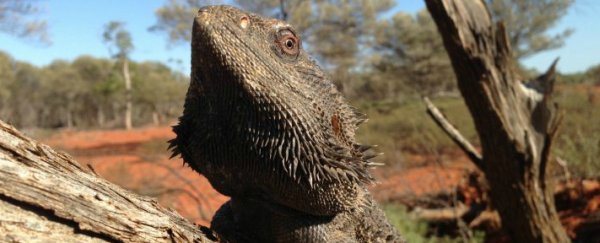The sex of young lizards emerging from the nest can be influenced by the surrounding temperature as well as their genetic make-up, Australian researchers have found - a phenomenon that has never before been seen in the wild.
A team from the Institute for Applied Ecology at the University of Canberra made the discovery after observing genetically male bearded dragons (Pogona vitticeps) living as females in the Australian outback. They discovered that these sex-swapping males were able to mate with regular males to produce fertile offspring.
Reptile embryos usually have their sex determined one of two ways: by the configuration of their chromosomes, or by the temperature while they're still in the egg. These two strategies were thought to be mutually exclusive, but the new research shows that Australian bearded dragon populations can rapidly switch from chromosome-determined sex to temperature-determined sex as the climate gets hotter.
The discovery has been published on the cover of Nature today.
"We had previously been able to demonstrate in the lab that when exposed to extreme temperatures, genetically male dragons turned into females," said lead researcher Clare Holleley. "Now we have shown that these sex reversed individuals are fertile and that this is a natural occurring phenomenon."
The team made the discovery after studying 131 adult dragons captured from the wild, and conducting controlled breeding experiments. Using molecular analyses, they were able to show that 11 of the lizards with male chromosomes were actually fertile females, after having their sex switched in the egg.
"By breeding the males sex-reversed to females with normal males, we could establish new breeding lines in which temperature alone determined sex," said Holleley. "In doing so, we discovered that these lizards could trigger a rapid transition from a genetically-dependent system to a temperature-dependent system."
Incredibly, these sex-reversed females laid more eggs than the normal mothers. "So in a way, one could actually argue that dad lizards make better mums," she added.
The research provides important insight into how reptiles determine the sex of their young in the wild, and how this could be affected as global temperatures continue to rise as a result of climate change.
The discovery also proves that animal sex determination isn't as set in stone as we once thought, and opens up the possibility that other species might also be able to switch sex-determination strategies depending on the temperature.
"The mechanisms that determine sex have a profound impact on the evolution and persistence of all sexually reproducing species," said Arthur Georges, senior ecologist at the University of Canberra's Institute for Applied Ecology, who oversaw the research. "The more we learn about them, the better-equipped we'll be to predict evolutionary responses to climate change and the impact this can have on biodiversity globally."
